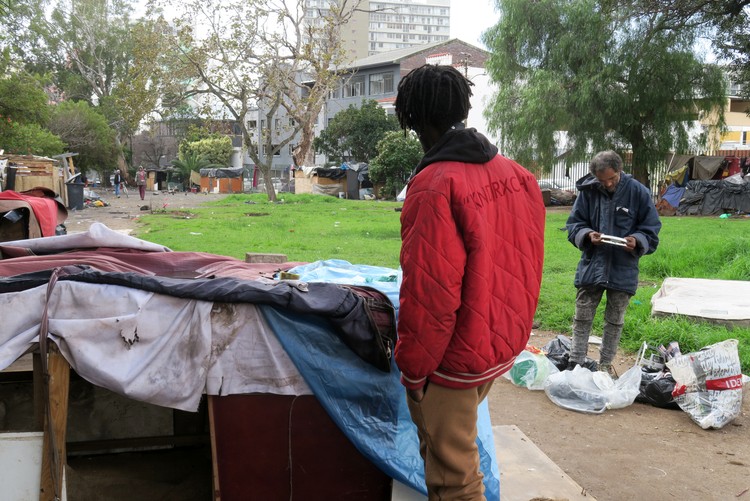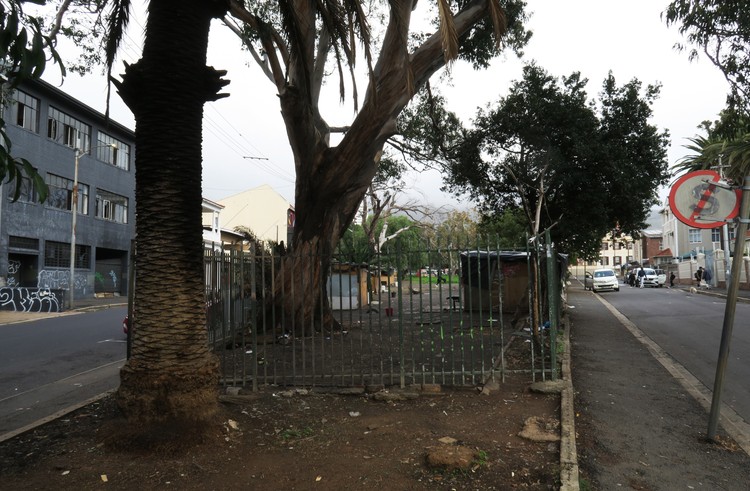Court to decide fate of Hope Street homeless camp
Housing rights group argues the City’s Safe Space shelters do not meet constitutional requirements for alternative accommodation
People living in Hope Street Park in lower Gardens say the City’s offer of accommodation at its Safe Spaces is not suitable. Represented by housing activist organisation Ndifuna Ukwazi, they are opposing the City’s attempt to evict them. Photos: Steve Kretzmann
- Cape Town wants to evict about 50 people living in structures around Hope Street Park in Gardens and move them to Safe Spaces sites.
- Ndifuna Ukwazi argues that Safe Spaces violate constitutional rights by locking people out from 8am to 5pm and banning entry after 8pm.
- The park has no running water or toilets but people living there say they feel safer there than in townships where gangs threaten them.
An application by the City of Cape Town to evict dozens of people living in and around Hope Street Park in Gardens, Cape Town, is before the Western Cape High Court.
Housing rights organisation Ndifuna Ukwazi (NU), representing the people living around the park, has filed a counter-application, stating that the City needs to provide alternative accommodation in accordance with the Prevention of Illegal Eviction from and Illegal Occupation of Land Act (PIE).
NU attorney Inga Dyantyi said the City had applied for an eviction order on 1 July 2024, and had responded to NU that it would move the people to its Safe Spaces sites. But NU argues these do not constitute suitable alternative accommodation, as the rules these sites do not uphold people’s constitutional rights to dignity and freedom of movement.
Safe Spaces lock people out at 8am and allow them back at 5pm. Entry is barred after 8pm.
“This is their accommodation, they are not children,” said Dyantyi, adding that it was also a practical problem for people who worked at night.
As no drugs or alcohol are allowed at the Safe Spaces, people with addictions were expected to go cold turkey for at least 12 hours. She said depending on a person’s level of substance dependence, this could be life-threatening.
NU had tried to enjoin the Minister of Social Development to the case, as the department has a duty to ensure there are sufficient substance abuse treatment facilities, and that a suitable level of care was provided at the City’s shelters. However, they were not successful.
She said the eviction application will be back before the high court on 14 October, and NU hopes to resolve some of the constitutional issues for its 50 clients during the hearing. The City, in its response, however, said, “A legal process has been concluded. The subcouncil will initiate the process of moving occupants to another location as noted in the last meeting in 2024.”
The City’s response on eviction proceedings will be added when received.
Lack of toilets and running water for dozens of people living in Hope Street Park and surrounding streets has created unhygienic conditions on the city block.
Growing number of people in park
Since the covid lockdown, an increasing number of people have been living in Hope Street Park, with the number of structures in the park now at about 30.
With no running water and no toilets, the area around the park, which also has a number of derelict buildings, stinks of faeces. Nonetheless, it is home for people such as Abosh, who has been living there since October 2021.
Abosh, who asked that his full name be withheld as he feared members of a gang he used to belong to would seek him out, said he felt safe at the park.
“No one from outside can rob you here,” he said, since everyone knew each other.
Abosh, who is 30, said he became homeless after his mother died and the landlord took back her home in the Bo-Kaap. He said he could also not live with his sisters in his late father’s house in Khayelitsha. He used to be a member of a gang there as an adolescent, and if he didn’t join them again, they would kill him. “There’s only one way out [of the gang],” he said.
He got his matric in 2013, while living with his mother, but says he could not find a job as he had a criminal record for theft and drug possession. He had served two years in Pollsmoor.
He said he wants to get a job with Streetscapes — an organisation that provides temporary City-funded jobs to homeless people — but he missed the last intake because of a leg injury. He had been beaten up by a group of revellers on Long Street.
He also wants to get into the Streetscapes housing programme, but he was still using drugs and had to find a way to get clean first.
It was clear that a number of people living at the park were dependent on drugs such as mandrax, and were psychologically unwell, or suffered from disabilities such as deafness.
More help needed
Meanwhile, school children attending St Mary’s Primary school opposite the park have for years not been able to make use of the open area.
Acting school principal Rensie Cloete said although she was only posted to the school in April this year, the staff told her the park used to be used for activities such as soccer and athletics, as the school only has tarred surfaces.
“The teachers say it was lovely when they used to use it before,” said Cloete.
She said the only other negative experience was a burglary in April, which was traced back to one of the people who lived in the park.
Local resident and member of the City Bowl Residents and Ratepayers Association Adrian Collins said it was sad to see the area he had walked past for decades deteriorate to its current state. He said it was terrible that people were living in unhygienic conditions, but they could not just be stripped of the shelter they had created for themselves and “shoved somewhere else”.
He said beyond addressing a massive housing shortage, there needed to be far more social workers and treatment centres.
While organisations like Streetscapes were doing “marvellous work”, it was not enough.
He said there was a desperate shortage of social workers.
“However many law enforcement officers we employ, let’s employ the equivalent number of social workers,” he suggested.
The City did not respond to questions asking how many social workers it employs.
Streetscapes spokesperson Chantel Sampson said they had a Public Employment Programme (PEP) funded by the City, which paid participants R200 a day to clean the City streets. As part of the programme, participants were also helped to adhere to any medical treatment they might be on.
She said a new PEP cohort is expected to be recruited in July, dependent on funds being provided by the City. People from the Hope Street Park are on the list.
Support independent journalism
Donate using Payfast

Don't miss out on the latest news
We respect your privacy, and promise we won't spam you.
Next: A taste of Somalia on the streets of Joburg
Previous: Illegal enlargement of West Coast farm dam condoned
© 2025 GroundUp. This article is licensed under a Creative Commons Attribution-NoDerivatives 4.0 International License.
You may republish this article, so long as you credit the authors and GroundUp, and do not change the text. Please include a link back to the original article.
We put an invisible pixel in the article so that we can count traffic to republishers. All analytics tools are solely on our servers. We do not give our logs to any third party. Logs are deleted after two weeks. We do not use any IP address identifying information except to count regional traffic. We are solely interested in counting hits, not tracking users. If you republish, please do not delete the invisible pixel.


